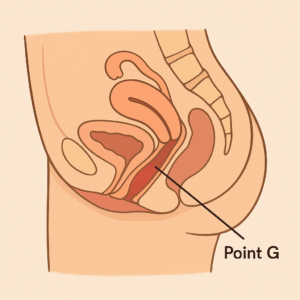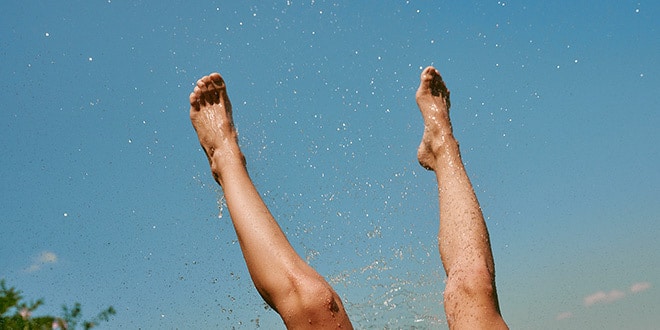
How do you make a woman squirt? How can you help her experience female ejaculation? And what exactly is female ejaculation?

Why Should We Care About Female Ejaculation?
Female ejaculation—or “squirting”—both fascinates and raises questions. Often misunderstood, misrepresented, or even caricatured in popular culture, it remains an integral part of female sexuality. More and more people are wondering: how do you make a woman squirt? Is it natural? Is it something all women can experience?
Exploring this phenomenon isn’t just about “doing more” in bed—it’s about getting to know the female body better, encouraging open and intimate communication, and exploring deeper, more authentic pleasure together.
Let’s make it clear right away: helping a woman squirt is not a performance, a duty, or a universal goal. Every body is different, and so is every sexual experience. This article is meant to support those who want to understand squirting—with kindness and no pressure—by offering a respectful, educational, and practical approach.
We’ll demystify the process, explore the ideal conditions, and explain the actual gestures and mindset needed to create a safe space for squirting. Because true pleasure is never just about technique—it’s about trust, release, adapted stimulation, and body awareness.
Mum and social worker the day, squirts at night!
What Is Squirting? Definitions and Clarifications
Before diving into how to make a woman squirt, we must understand what squirting is and how it differs from other forms of pleasure.
Squirting is the expulsion of clear, warm fluid through the urethra, usually during intense sexual stimulation—most often involving the G-spot. It can be a little or a lot, with or without orgasm. It’s not a systematic phenomenon and varies widely among women.
Squirting vs. Female Ejaculation
The terms “squirting” and “female ejaculation” are often confused. Here are the key differences:
- Female ejaculation refers to a small release of whitish liquid from the Skene’s glands, often described as the female prostate.
- Squirting involves a larger expulsion of clear, watery fluid from the urethra.
Both can happen together or separately. Scientific studies (though limited) confirm that squirting fluid may contain traces of urea but is not simply urine.
What matters most is understanding that squirting is a natural physiological response, one that depends not just on technique but also on a woman’s emotional and physical readiness.
So yes—your technique matters, but so does her psychological state.
Anatomy of Pleasure: Understanding the Female Body
To support female ejaculation, one must understand the zones involved in this response. This means knowing how the body works, and acting with precision, gentleness, and patience.
The G-Spot
The famous G-spot (or G-zone) is located about 3 to 5 cm inside the vagina, on the anterior wall (facing the belly). It’s not a tiny button, but a spongy area that swells with stimulation and becomes highly sensitive.
Proper stimulation—progressive, rhythmic, and attuned—can trigger powerful sensations that lead to orgasm or squirting.

Skene’s Glands
These small glands sit around the urethra and secrete the liquid involved in female ejaculation. They can release a small amount (classic ejaculation) or a larger volume (squirting).
Other Areas Not to Overlook
- The clitoris, though not directly involved in squirting, can amplify arousal and sensations.
- The perineum (the area between the vagina and anus) also plays a role in helping muscles relax, which is essential for letting go.
Having this anatomical understanding allows you to adapt your actions, avoid discomfort, and create pleasurable and respectful stimulation.
What Conditions Help a Woman Squirt?
Squirting isn’t guaranteed. It depends on several combined factors:
1. A Safe and Trusting Environment
A woman can’t let go unless she feels safe. Trust in her partner is crucial. She must be able to express herself freely, set boundaries, and never feel judged.
2. Physical and Emotional Release
Squirting is often blocked by a subconscious fear of urination. Many women tighten their pelvic muscles when pressure builds. It’s important to normalize the sensation and remind her there’s nothing shameful about it.
3. A Relaxed, Receptive Body
Ideal conditions include:
- Proper hydration
- Low stress
- No external distractions
Certain positions improve G-spot access—such as lying on the back, legs open or bent.
4. Gradual and Targeted Stimulation
Rushing can ruin everything. Instead:
- Start with foreplay, kissing, and deep relaxation
- Move to G-spot stimulation using fingers or curved toys
- Keep a steady, firm but gentle rhythm
Step-by-Step: How to Encourage Female Ejaculation
Here’s a detailed guide to support a woman through the squirting process:
Step 1: Set the Mood
- Choose a stress-free moment
- Lay down towels or absorbent pads
- Use soft lighting and soothing music
Step 2: Relax and Arouse
- Begin with kisses, caresses, breathing together
- Stimulate the clitoris gently to awaken pleasure
- Massage the lower belly, inner thighs, and perineum
Step 3: Access the G-Spot
- Insert one or two fingers, palm facing up
- Use a “come here” motion
- Slowly increase pressure
- Pay close attention to her reactions
Step 4: Maintain the Rhythm
When she’s close to squirting, she may feel:
- A strong urge to pee
- A wave of internal heat
- A tension in her abdomen or pelvis
Do not stop unless she asks. Encourage her to breathe and, if she wants, gently push with her pelvic muscles.
Step 5: Support the Release
The moment of squirting can be:
- Noisy or quiet
- Energetic or soft
- With or without orgasm
Don’t interrupt the moment. Stay present, tender, and emotionally available as she comes down from the peak.
(If you’re a woman wanting to learn how to squirt solo, click here >>)
What a Woman Feels When She Squirts
Sensations differ, but often include:
- An intense emotional release, like an adrenaline rush
- Warmth, relaxation, and euphoria
- Laughter, tears, or quietness
- Mild muscular fatigue, like post-exercise
Some women feel this as deeply emotional, others as purely physical. In either case, respecting her personal experience is essential.
Don’t treat her like a sideshow—it can create emotional blocks.
As for what a man might feel when he helps his partner squirt? A deep sense of pride and satisfaction in knowing he gave her that experience.
And yes—squirting women are often multi-orgasmic.

What You Should Absolutely Avoid
- Pushing if she’s not into it—consent comes first
- Treating squirting like a performance goal
- Laughing or reacting awkwardly—it can cause lasting shame
- Using rough or painful movements—always be gentle
This is not about “making her squirt at all costs,” but inviting a fun, pressure-free discovery.
Busting the Myths
- “It’s urine” → False. It’s not pure urine—it’s different.
- “No squirting = no pleasure” → False. Completely untrue.
- “A real woman squirts” → Wrong. That’s toxic pressure.
- Squirting is natural, but not mandatory.
- Every woman’s body is unique.
The Partner’s Role: Kindness, Listening, and Patience
The partner’s job is key:
- Create a pressure-free zone
- Observe and respond to her cues
- Let go of expectations
- Accept that it won’t always happen—and that’s okay
Good sex is based on trust, authenticity, and adaptability—not fixed results.
Final Thoughts: Respect Over Results
Helping a woman squirt is possible—but it should never become a rule or a must-do. It’s an intimate, emotional, personal part of sexuality.
With active listening, patience, respect for rhythm, and open communication, you can create the right space for it to happen. But the real beauty is in the journey itself: discovering her body, sharing joy, and deepening your connection.
Once again—it depends greatly on the woman. As men, our role is to reassure, encourage, and stimulate correctly. The rest is up to her.
And yes—a woman can train herself to squirt, even solo, through masturbation. In fact, most women discover this capacity later in life.
Your dating coach,
Fabrice Julien

